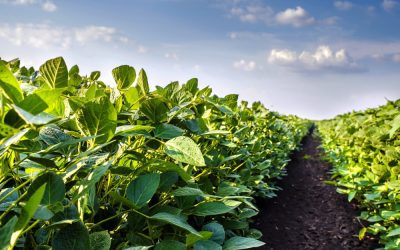Rodibaugh to term off after nine years on ISA board
Dedication. Advocacy. Leader. These are all great adjectives to describe Indiana Soybean Alliance board member David Rodibaugh. After nine years of diligently serving Hoosier farmers and consumers, he will hang up his hat when his last term ends in January 2022.
Rodibaugh graduated from Purdue University in 1973 with a Bachelor’s degree in Agricultural Economics. After graduation and a two-year term in the U.S. Air Force, he moved back to the farm, which was started in the 1940s, to work with his dad and brothers. What started as a hog operation, selling mostly breeding stock to commercial producers, grew into row crop farming and raising farrow-tofinish breeding hogs and show stock.
Since those days in the 1970s and early 1980s, Rodibaugh said new farm technology has accelerated rapidly, and he admires how quickly farmers adopted those changes. He noted that the broad-spectrum herbicide Roundup, also known as glyphosate, was a great advancement of weed pressure control. Weed control herbicides allowed farmers to more easily adopt no-till practices, Rodibaugh added.

Looking ahead he is excited about advancements with data technology and how the data farmers are collecting today will allow for less inputs in the future.
The Rodibaughs began working to enhance their soil structure in the 1980s beginning with reducing tillage. He said, since the main focus of his family farm was on the hog operation, a lack of time helped his family to start reduced tillage ahead of the crowd. They discovered that no-till saves fuel and keeps equipment maintenance low, while also contributing to better soil health and decreased wind erosion, which is crucial on the Jasper County variable sandy soils.
“We think no-till is better for the soil in the long run, but it is also better for our bottom line,” Rodibaugh said.
His farm began incorporating cover crops roughly five years ago and said they will continue to make those work. On his farm, they realized it’s not as easy as some think.
Rodibaugh advises farmers to try new things, in small amounts if possible, and to not try everything.
Adding value to today’s crops
When reflecting on his time with Indiana Soybean Alliance (ISA), Rodibaugh said there has been expansion through the years in export markets and new product advancement. New product development is vital, he said, for adding value to today’s crops. A recent example is the soy-based durability enhancer called PoreShield.
During his nearly decade of service, Rodibaugh noted three major ISA investments that have contributed to expanding export markets, new product development, research and Indiana agriculture, in general.
Most notably is the Indiana Corn and Soybean Innovation Center at Purdue University. The concept of a plant innovation center was led by Purdue University President and former Indiana Gov. Mitch Daniels, Rodibaugh said. Daniels recognized the value of furthering plant science data at the research university. The Indiana Corn and Soybean Innovation Center and partnership with Purdue’s leadership has led to key advancements in research, analyzing crops and highlighting soybean uses and projects.
Rodibaugh notes that while the innovation center is great for farmers, ag chemists, researchers and more, it is also incredibly beneficial to consumers in the end, because the research performed leads to lower production cost and safe, nutritious products.
Rodibaugh has been a champion for research since the beginning of his career.
Purdue University had its first Student Soybean Innovation Competition in 1994, where soy-based crayons took home the winning prize. Purdue partnered with ISA on the competition. Since 1994, contest winners have created herbicides, drinking straws, athletic tape and candles – all made with soybean-based ingredients. The most recent Student Soybean Innovation Competition winners were Cai Chen, Nate Nauman and Emmanuel Alagbe, who created a liquid biostimulant out of soybeans. Biostimulants help crops germinate rapidly, achieve greater plant mass, and improve nutrient uptake.
The Glass Barn at the Indiana State Fairgrounds and Event Center is another ISA investment made in recent years that Rodibaugh said is an excellent use of resources. The building, unveiled in 2013, attracts thousands of visitors each year and hosts a variety of events, even during non-fair season with the state fair’s educational initiatives and field trips that run throughout the year. Rodibaugh said visitors enjoy lengthy stays at the Glass Barn and become more engaged as they move through the building. He said many guests return year after year to add the most recent “BeanGo” hat to their collection. Since the building is meant to educate consumers, Rodibaugh is pleased that it does just that.
Lastly, he explained that the ISA and Indiana Corn Marketing Council’s office building on the north-side of Indianapolis has been a wise investment because it brings together many of the different agriculture organizations under one roof. This promotes relationship building and collaboration between the different farm sectors. The building is a host for many meetings and conferences for all types of agricultural businesses and organizations. Even though it is just a building, it truly brings the whole agriculture industry together, Rodibaugh said.

Rodibaugh: Get involved
During his years of service, Rodibaugh has volunteered with many organizations. He served as chair of the Jasper County Soil and Water Conservation Board; and in 1992, he served as the president of the Indiana Pork Producers Association. In addition, Rodibaugh served two terms as president on the Rensselaer Central School Board. He has served on the ISA board from 2013-21, and as chair for one year.
Rodibaugh encourages farmers to get involved. For Rodibaugh, his service has led to new connections. He said sharing information helps to create a bigger picture of the world and to build vital relationships.

“I have given a lot of time and effort during my time on the ISA board, but that’s what you sign up for when you decide to run for one of the positions on the board,” Rodibaugh explained. “However, I have received so much more during this time. The people I’ve met and the things I’ve learned have a value that I can’t measure. For all of the reasons to get involved in a farm organization, the people, the education and the experience are the most important.”
He noted that the ISA board is diverse in many ways. His board service has helped him build good relationships and contacts, and it allowed him to serve in a capacity he never would have dreamed. He said the ISA board and staff bring many talents to benefit soybean growers.
Rodibaugh, his wife, Danita, and three brothers farm corn, soybeans and wheat in Jasper County, Ind. They continue to raise farrow-to-finish breeding stock hogs and show pigs. The Rodibaughs have four children and eight grandchildren.
Posted: October 31, 2022
Category: Indiana Corn and Soybean Post - Fall 2021, ISA, News




